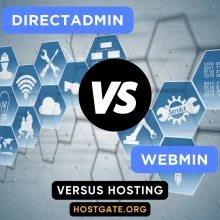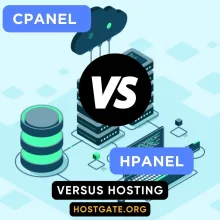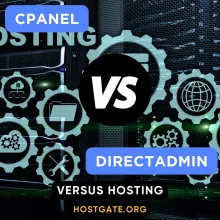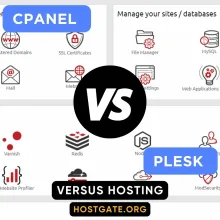cPanel VS CyberPanel – Which One is Better? | HostingVS
CyberPanel and cPanel are web hosting control panels with distinct approaches to server management. CyberPanel offers a modern, lightweight solution powered by OpenLiteSpeed, emphasizing performance and cost-efficiency for developers and small businesses. cPanel provides a traditional, feature-rich platform with extensive compatibility and comprehensive tools for established hosting providers.
Both platforms deliver core functionalities like domain management, file systems, and email hosting, with unique security implementations. The choice between them depends on specific organizational requirements, including budget, technical expertise, performance needs, and scalability expectations. While CyberPanel targets performance-focused organizations with a streamlined interface, cPanel remains preferred for enterprise environments requiring extensive features and proven reliability.

 Experience the Most Affordable and Reliable Cloud Web Hosting Cloud Web Hosting Starting at Just $3.99/month! - Unlimited Storage & Traffic - Free Domain Included - 24/7 Expert Support - Dedecated & VPS Hosting Plans |
cPanel vs CyberPanel | cPanel Control Panel | CyberPanel Control Panel |
Performance Architecture | OpenLiteSpeed powered, lightweight, optimized for modern web environments | Traditional Linux-based, mature platform with extensive compatibility |
Security Approach | Integrated ModSecurity, Immunify360, modern threat prevention | Established security tools, SSL/TLS managers, extensive third-party add-ons |
Target Audience | Developers, small businesses, performance-focused organizations | Established hosting providers, enterprise environments, traditional infrastructure |
User Interface | Modern, streamlined, developer-friendly interface | Traditional, feature-rich, comprehensive customization options |
Pricing Model | Flexible pricing with free and enterprise options | Tiered licensing approach with no free version, higher cost structure |
cPanel vs CyberPanel: A Comprehensive Hosting Control Panel Comparison
In the dynamic world of web hosting management, control panels serve as critical infrastructure for website operations. CyberPanel and cPanel represent two distinctive approaches to server management, each offering unique strengths and capabilities for developers, businesses, and hosting providers. This comprehensive comparison explores their technical architecture, performance, features, and strategic advantages.
Technical Architecture: Modern vs Traditional Frameworks
CyberPanel emerges as a contemporary solution powered by OpenLiteSpeed, delivering a lightweight and performance-optimized framework designed for modern web environments. Its architecture prioritizes speed and efficiency, leveraging next-generation web server technologies. In contrast, cPanel represents a traditional Linux-based platform with decades of industry refinement, offering extensive compatibility and proven reliability through its mature ecosystem.
Performance Metrics: Efficiency and Speed Considerations
Performance dynamics reveal nuanced differences between the two platforms. CyberPanel excels in resource efficiency, utilizing OpenLiteSpeed’s advanced caching mechanisms to deliver rapid load handling and optimized server performance. cPanel demonstrates consistent performance through well-established optimization techniques, with performance variations dependent on specific server configurations and workload complexities.
Feature Comparison: Functionality and User Experience
Both platforms provide comprehensive feature sets covering critical web hosting requirements, including domain management, file systems, database support, and email hosting. CyberPanel distinguishes itself with a modern, streamlined interface targeting developer-friendly environments. cPanel offers a more traditional, feature-rich interface with extensive customization options catering to diverse technical proficiencies.
Security Landscape: Protecting Digital Assets
Security implementations represent a critical differentiator between these control panels. CyberPanel integrates robust security mechanisms like ModSecurity and Immunify360, offering proactive threat prevention and comprehensive protection strategies. cPanel counters with established security tools including SSL/TLS managers, IP blockers, and extensive third-party security add-ons, providing multilayered defense against potential cyber threats.
Ecosystem and Add-Ons: Extending Functionality
CyberPanel’s ecosystem emphasizes targeted, lightweight add-ons such as WordPress Manager and LiteSpeed Cache, focusing on specific performance and development needs. The platform prioritizes efficiency and streamlined functionality. cPanel’s add-on landscape is more expansive, featuring comprehensive solutions like CloudLinux for server isolation and JetBackup, providing advanced data protection and recovery mechanisms.
Pricing and Licensing: Cost-Effectiveness Considerations
CyberPanel offers more flexible pricing models, including free and enterprise options, making it attractive for budget-conscious users and small to medium enterprises. This approach provides accessibility and scalability for growing businesses. cPanel employs a tiered licensing strategy with no free version, structured around organizational scales ranging from solo practitioners to large hosting environments, potentially limiting entry for smaller organizations.
Pros and Cons: Balanced Assessment
CyberPanel’s strengths include its modern architecture, resource efficiency, and cost-effectiveness. However, potential limitations exist in community support and ecosystem maturity. cPanel’s advantages encompass extensive documentation, widespread industry adoption, and comprehensive features, balanced against higher costs and potentially resource-intensive operational requirements.
Target Audience: Strategic Positioning
CyberPanel targets developers, small businesses, and performance-focused organizations seeking lightweight, modern hosting solutions. Its appeal lies in streamlined performance and affordability. cPanel remains preferred by established hosting providers, enterprise environments, and users requiring extensive features and traditional management interfaces with proven reliability.
Comparative Decision Matrix: Making the Right Choice
Selecting between CyberPanel and cPanel depends on specific organizational requirements, including:
- Budget constraints
- Technical expertise levels
- Performance expectations
- Scalability requirements
- Specific hosting infrastructure needs
A strategic assessment of individual hosting objectives becomes crucial in making an informed decision.
Potential Downsides to Consider
CyberPanel Limitations
- Limited community support compared to established platforms
- Smaller ecosystem of third-party integrations
- Potential compatibility challenges with legacy systems
cPanel Limitations
- Increasingly expensive licensing model
- Higher resource consumption
- Limited flexibility for custom configurations
- Exclusively Linux-based platform
Future Trends and Conclusion
No universal “best” control panel exists; optimal selection emerges from aligning platform capabilities with specific organizational requirements. Future hosting trends suggest continued innovation, with platforms like CyberPanel challenging established paradigms through performance-driven, resource-efficient architectures.
Emerging technologies and evolving web hosting needs will likely drive further development in control panel solutions, emphasizing speed, security, and user-centric design.
Recommendation
For small to medium businesses prioritizing performance and cost-efficiency: Consider CyberPanel
For enterprise environments requiring comprehensive features: Recommend cPanel
For developers seeking modern, lightweight solutions: Explore CyberPanel
For traditional, feature-rich environments: Maintain cPanel infrastructure
Summary and FAQs
What is the primary difference between CyberPanel and cPanel?
The primary difference between CyberPanel and cPanel lies in their architectural approach and design philosophy:
- CyberPanel is a modern, lightweight control panel powered by OpenLiteSpeed, emphasizing performance efficiency and developer-friendly interfaces.
- cPanel is a traditional, mature Linux-based platform with an extensive, feature-rich ecosystem focused on comprehensive hosting management and widespread industry compatibility.
Key distinctions include:
- Architecture: Contemporary (CyberPanel) vs established (cPanel)
- Performance: Optimized, resource-efficient (CyberPanel) vs consistent, proven (cPanel)
- Target Audience: Small businesses and developers (CyberPanel) vs enterprise environments (cPanel)
- Pricing: More flexible, including free options (CyberPanel) vs tiered licensing (cPanel)
Is CyberPanel free to use?
CyberPanel offers flexible pricing models, including free options. The document specifically mentions that CyberPanel provides both free and enterprise options, making it attractive for budget-conscious users and small to medium enterprises. This contrasts with cPanel, which has no free version and uses a tiered licensing strategy.
Which control panel is better for small businesses?
For small businesses, CyberPanel is recommended due to:
Cost-effectiveness
- Offers free and affordable options
- Flexible pricing models
Performance
- Resource-efficient
- Lightweight architecture
- Optimized for modern web environments
Targeted Features
- Developer-friendly interface
- Streamlined functionality
- Suitable for growing businesses
The article specifically recommends CyberPanel for “small to medium businesses prioritizing performance and cost-efficiency”.
Can CyberPanel be used on Windows servers?
No, CyberPanel does not natively support Windows servers. It is primarily designed for Linux-based systems like Ubuntu and CentOS. However, you can use CyberPanel on Windows by:
- Using Windows Subsystem for Linux (WSL)
- Running it in a Virtual Machine
For a native installation, a Linux server is recommended.
What security features do CyberPanel and cPanel offer?
Security Features:
CyberPanel:
- ModSecurity integration
- Immunify360 protection
- Proactive threat prevention
- Comprehensive protection strategies
cPanel:
- SSL/TLS managers
- IP blockers
- Extensive third-party security add-ons
- Multilayered defense mechanisms
Both platforms prioritize robust security, with CyberPanel offering more modern, integrated solutions and cPanel providing comprehensive, established security tools.





